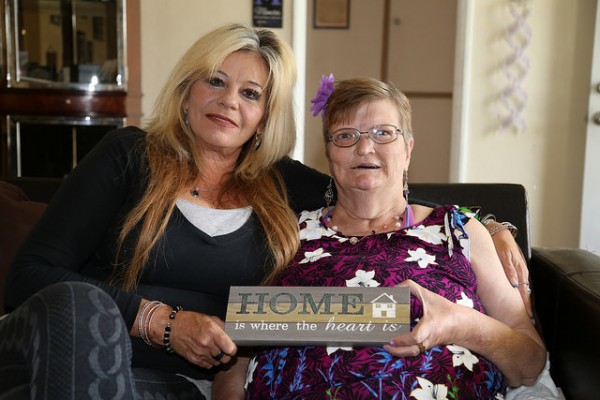My name is Toni Monique Taloa, and I’m a home care provider in Buena Park, California. I initially became a professional home care worker to take care of my elderly grandmother. My grandmother was originally assessed just 80 hours of in-home care each month – far less than she needed – by California’s In-Home Supportive Services (IHSS) home care program. My union, the United Domestic Workers/AFSCME Local 3930 (UDW), helped me successfully appeal the decision, and my grandmother’s home care hours were increased from 80 to 283 per month.
As a person who honestly did not believe in the power of being a union member, this help was just what was needed to change my mind. After that I wanted to know what else the collective power of home care workers could accomplish, so I became a UDW volunteer. As a more involved member, I would eventually become one of the many home care providers in California who fought for fair implementation of our overtime benefits.
My grandmother has since passed away, but I’ve been responsible for my sister Tonya’s care since 2012. When Tonya was born, she was diagnosed with hydrocephalus, also known as water on the brain, which caused cerebral palsy. When I learned my sister had been moved into a nursing home, I took her out and moved her into my home. I knew my sister would get the best possible care among family with me working as her caregiver.
Unfortunately, despite the vital, cost saving nature of our profession, working as a home care provider has been rough on my budget. There have been many times when I wasn’t really living, I was just surviving. And it’s not just me who is affected: my sister Tonya depends on me to provide for her needs as well, including food, shelter, clothing, transportation, and medication.
That’s why I got involved with my fellow UDW home care workers in our fight to win overtime pay. I knew we were excluded, but I never knew why. I was excited when in 2011, President Obama announced in-home caregivers would soon receive basic labor protections like overtime. And I joined my fellow caregivers in celebration when the U.S. Department of Labor amended the Fair Labor Standards Act to include home care workers after decades of unfair exclusion.
After the announcement at the federal level, we fought hard, wading through challenges in the courts and from our own governor. When overtime was finally implemented here in California for IHSS home care providers, it changed not only my life, but Tonya’s as well.
Now that I have overtime pay, I’ve been able to comfortably provide Tonya with the food her condition requires her to have. I’m able to pay our rent, and no longer live with the fear that we could be evicted from our home, forcing me into a shelter and Tonya back into a nursing home. Overall, overtime pay was crucial to ensuring Tonya and I are able to remain in our home. And the extra money overtime provides gave me something I think is priceless: time. Tonya has a second home care provider who comes in 20 hours per month to give me a break – something we would not have been able to afford in the past.


